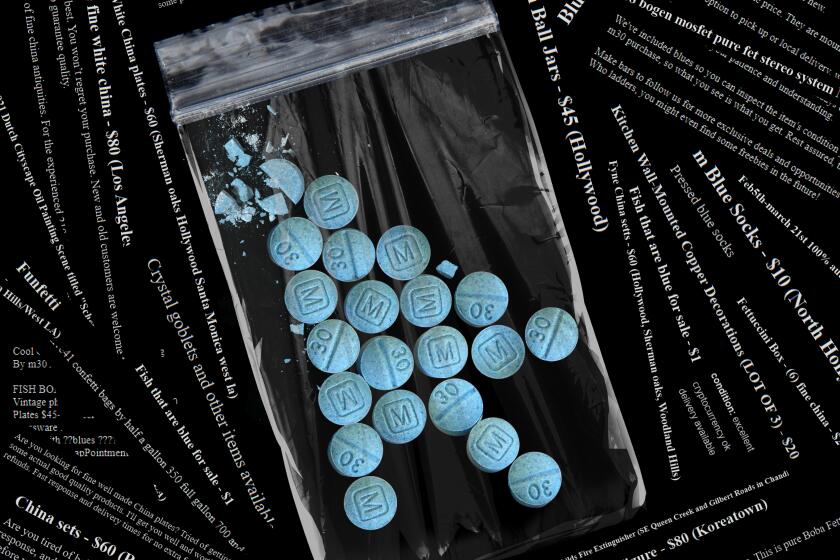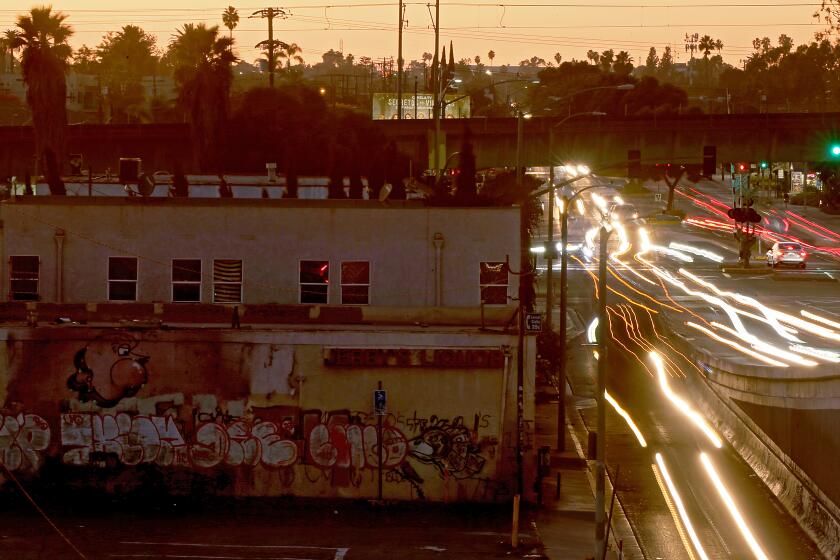San Diego County says it’s nearly stamped out illegal cannabis dispensaries. Why can’t L.A. County?
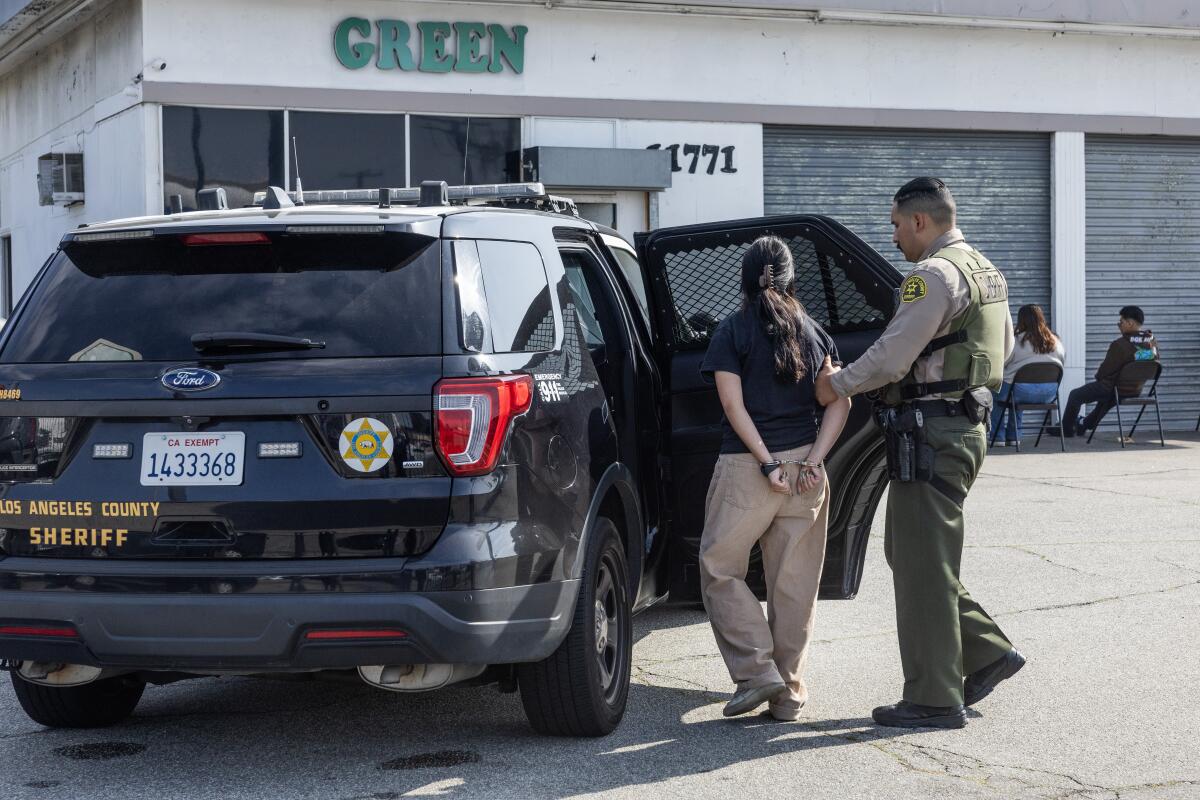
The van screeched to a halt in a parking lot along a busy Whittier thoroughfare. A half-dozen men in army-green body armor and tactical helmets hopped out with guns drawn. Their target: a former used car dealership converted into an illegal cannabis dispensary called Whittier Super Greens.
“L.A. County Sheriff’s Department search warrant, make yourself known,” one detective called out. Mexican pop music blasted in the background as they entered the shop and hustled the employees and customers out front. “Come on, buddy, let’s see your hands. Come on.”
Less than five minutes after the May 10 raid began, five people were sitting on metal folding chairs outside the corrugated metal garage doors. Undercover detectives emerged with big brown bags of cannabis and psilocybin mushroom products.
One employee was arrested and charged over the mushrooms. The deputies let everyone else go with a warning and closed down the store.
It was back open within weeks.
The temporary shuttering of Whittier Super Greens was the latest iteration in a cycle that has frustrated county law enforcement for years.
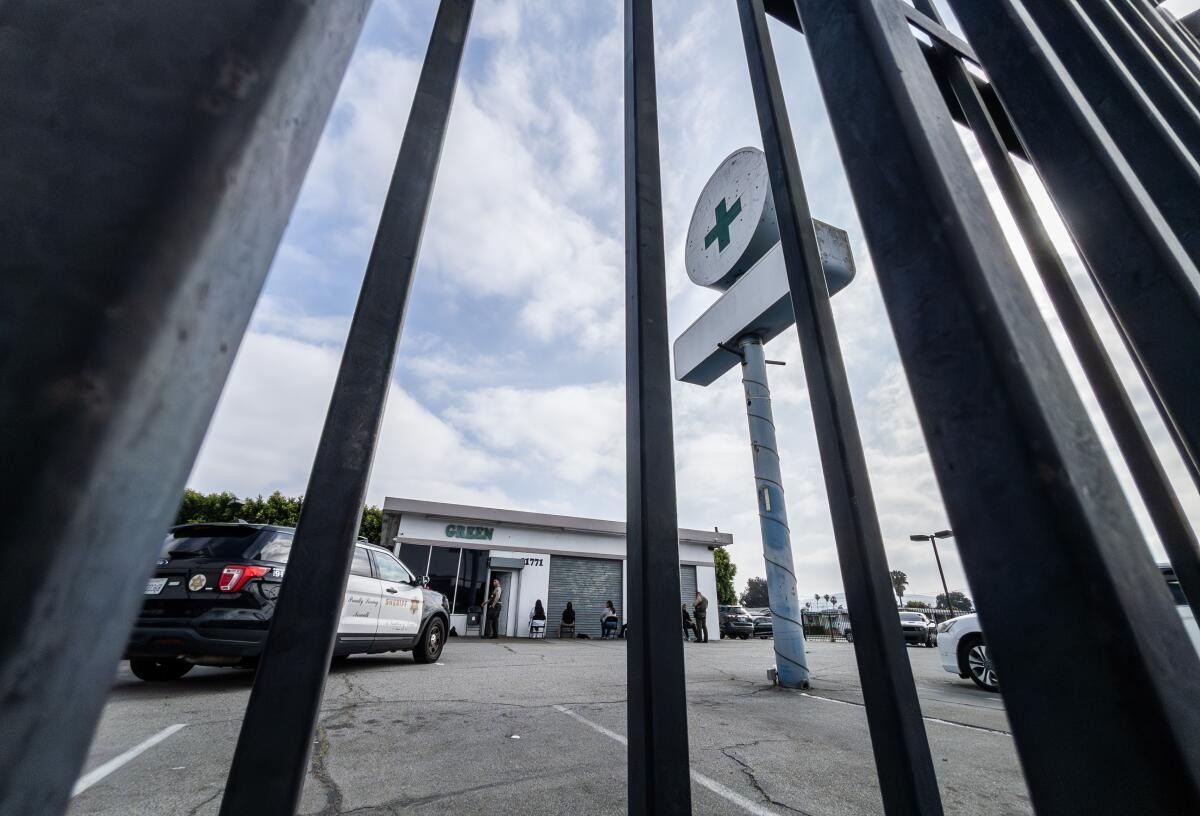
Despite authorities making hundreds of arrests and seizing thousands of pounds of cannabis, illegal dispensaries remain a common sight in commercial districts across Los Angeles County.
While local authorities struggle to make headway, 125 miles south the same problem has essentially been solved. San Diego County authorities say they have all but stamped out the black market storefronts, which raises the question: Why can’t L.A. County do the same?
Officials in both places say the solution is complicated, but it boils down to a combination of political will, coordination between agencies — and cold, hard cash.
Whereas other sites and apps almost eliminated drug postings after scrutiny by law enforcement, dealers on Craigslist seemingly remained active using code words.
The unlicensed shops generate millions in untaxed sales, often meeting market demand in municipalities and unincorporated areas that have yet to authorize local cannabis sales despite statewide recreational legalization in 2016.
But while one county continues to fail, the other has gotten creative, using a multipronged strategy that involves everyone, including tax collectors and the state Department of Fish and Wildlife.
Things are going so poorly in L.A. County, according to Lt. Jay Moss of the Sheriff’s Department’s major narcotics unit, that after paying a few thousand dollars of taxes and fees, many unlicensed cannabis shops resume sales within hours.
“We’d shut them down, and they’d reopen in a very short period of time,” Moss said. “It’s almost like they understand that’s the cost of doing business.”
Incentives to skirt the rules
Less than two weeks after the raid at Whittier Super Greens, it was as if the Sheriff’s Department’s early-morning operation had never happened.
A man sat behind a darkened window just inside the front door the afternoon of May 23, gruffly checking IDs and letting people into the back room, where a wide range of products were lined up in fluorescent-lit display cases.
Two young salespeople were showing cannabis flower and prerolls to a handful of customers. A sign next to an electric rig offered free “dabs” of high-potency THC wax with a warning: “Do not cough on bud tenders.”
Lt. Richard White of the Sheriff’s Department’s narcotics bureau noted that the store had been raided before and likely will be again.
A rare condition called hallucinogen persisting perception disorder has puzzled researchers and raised alarms as psychedelics go mainstream.
“It’s definitely profitable enough for them to either relocate or reopen,” White said after he and his team wrapped up the enforcement operation last month. “Why wouldn’t these businesses continue to skirt the rules?”
Unlicensed dispensaries are by their nature criminal operations, linked to cartels and other outlaw groups.
The cannabis, edibles and vapes are often indistinguishable from their legal counterparts, aside from the bargain prices. The illicit products aren’t taxed or subjected to the state’s quality-control regime to protect consumers from heavy metals, pesticides and other dangerous substances.
Many customers can’t tell whether a shop has a license. Both kinds run the gamut from sparse rooms with little more than a few shelves and a cash register to posh, well-appointed spaces more akin to Apple stores than drug dens, with tasteful decor, high-end furniture and friendly salespeople.
Dispensaries began to proliferate after medical marijuana legalization took effect in California in 1996. The businesses — some authorized by the state, most not — have since become as common a sight as pharmacies or convenience stores in many neighborhoods.
Los Angeles County accounts for a tenth of the total number of dispensaries thought to operate nationwide, according to a Pew Research Center study released in February, with nearly 1,500 pot retailers.
But state Department of Cannabis Control data show there were only 384 with licenses in L.A. County as of 2022.
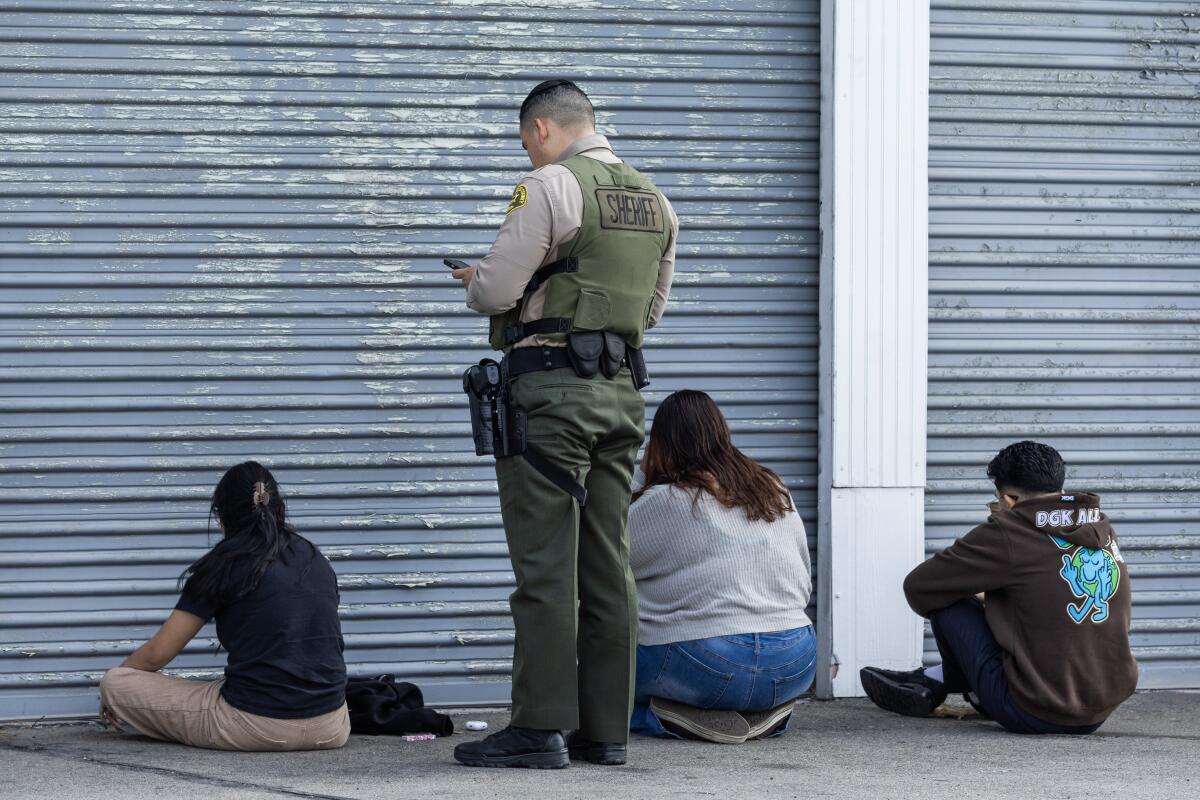
Raids like the one last month in Whittier are part of an effort that even White — the sheriff’s detective involved in the operation — conceded is not particularly robust or effective.
He said a small county team, the Cannabis Consumer Health and Safety Task Force, has raided just two to four of the illicit businesses per month over the past year, mostly spurred by resident complaints.
That’s a far slower clip than in the past. From October 2021 to April 2022, the department reported that it executed search warrants at more than 122 dispensaries, making more than 277 arrests and seizing thousands of pounds of marijuana and edibles.
The slowdown is partly budget-related. Instead of targeting dispensaries within the scope of their daily duties, the county pays Sheriff’s Department personnel overtime for their participation in the efforts. Local municipalities that contract with the department foot the bill for operations within their borders.
A one-time county allocation gave the multiagency county task force more than $2 million for overtime pay to go after illegal dispensaries in unincorporated areas in 2021. But county budget records show hundreds of thousands of those dollars went unspent, and the county has since backed off such intensive enforcement.
“You have a large shadow organization running these dispensaries, and it’s very profitable,” White said, “and on our side, there’s a limit to our manpower and funding to tackle this problem.”
‘A whole myriad of friends’
The problems vexing White are familiar to his counterpart a three-hour drive south. San Diego County Sheriff’s Department Sgt. Nick Backouris runs a team of detectives that for the past decade has been tasked with interdicting unlicensed cannabis businesses.
“Three, four years ago, they were at the height of selling cannabis and whatnot, and it was pretty standard,” Backouris said.
But such shops are now rare.
“I haven’t seen one in quite some time,” he said.
There’s a lot of overlap between the way the two counties operate.
In L.A., the Sheriff’s Department’s efforts are coordinated with the state Department of Cannabis Control and the California Department of Tax and Fee Administration, which White said can conduct “till tolls,” demanding immediate payment of outstanding taxes. Utility companies sometimes tag along and can shut down service.
A year after The Times began investigating Mexican pharmacies’ sales of fake medications — after U.S. safety warnings and raids by Mexican authorities — the problem persists.
The L.A. Office of County Counsel pursues other means of kneecapping illegal dispensaries, such as asset forfeiture and civil suits.
But according to Moss of the sheriff’s major narcotics unit, webs of limited liability companies and fictitious names can render many such efforts futile.
San Diego County doesn’t give up so easily.
Backouris said his team brings in “a whole myriad of friends” after obtaining a search warrant for an illegal dispensary.
Scientists from the California Department of Fish and Wildlife inspect the property for improper water discharge. If unpaid taxes can’t be paid on the spot, tax-related felony charges are filed.
If code inspectors find violations, the county’s water board and electric company cuts services. And, in some cases, buildings are seized.
Legal dispensary owners also have been proactive, Backouris said, in some cases filing lawsuits that add to the troubles of their outlaw competitors.
Most were left with no option but to give up on the illicit industry. Those who stuck it out risked facing criminal prosecution, including with money laundering cases that targeted owners.
In 2021, the San Diego County Board of Supervisors earmarked nearly $3 million for the battle against illegal dispensaries. Rather than paying for Sheriff’s Department overtime, the county created a dedicated enforcement team and hired additional support staff for the district attorney’s office.
Meanwhile, in L.A. County, White said sometimes the D.A.’s office will charge an employee or two and occasionally the business or building owner with selling narcotics or other violations.
“The ultimate goal is to identify who the business owner is who’s responsible for running it as opposed to the workers in the building,” Moss said. “But that can be very difficult.”
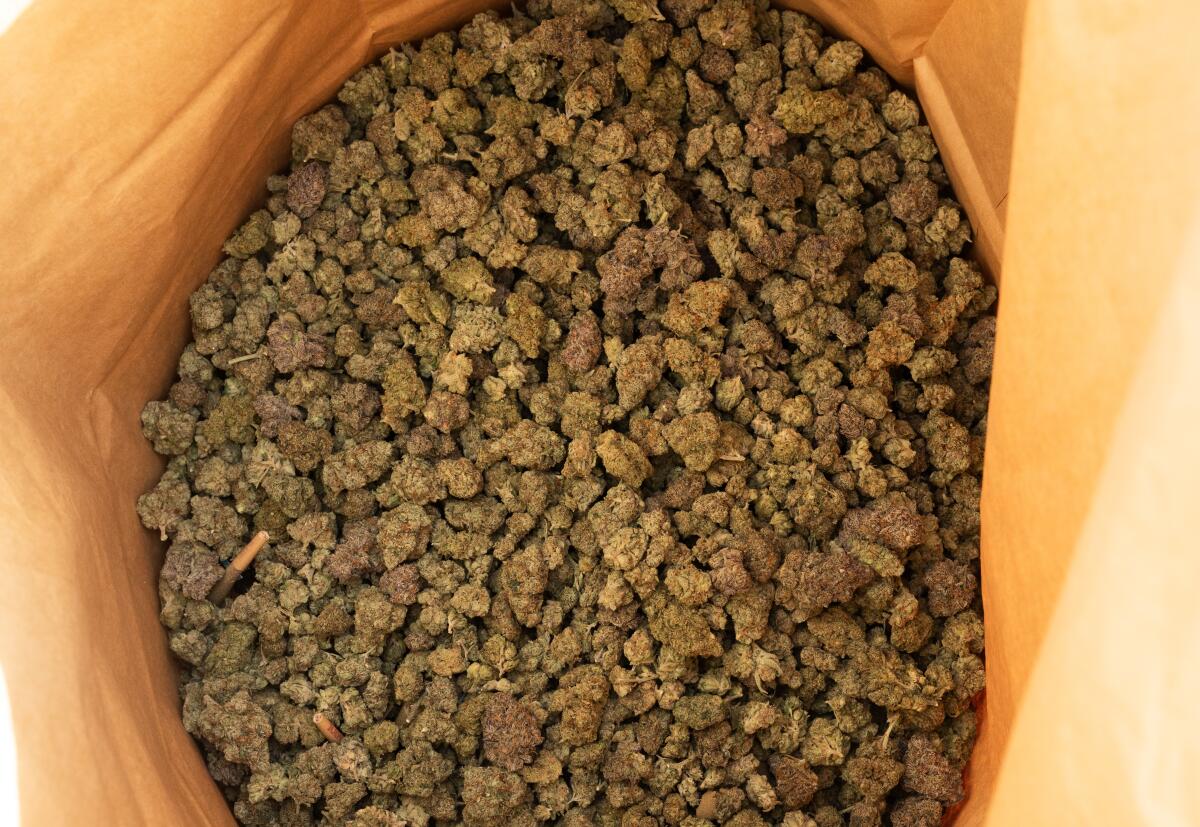
Like ‘shutting down crack houses’
San Diego County hasn’t completely won its war on illegal marijuana.
Licensed purveyors have complained that delivery services have taken over much of the illicit business. And as in L.A., smoke shops there still commonly carry products that mimic cannabis or surreptitiously contain THC.
But brick-and-mortar bootleggers are a thing of the past.
Back in L.A. County, Compton officials are seeking to replicate that success.
Between 30 and 100 illegal cannabis retailers were estimated to have been operating within Compton’s borders as recently as last spring, catering to clientele in a municipality that had steadfastly banned regulated sales.
That number has sharply declined since last year, according to Councilman Andre Spicer, but not because of enforcement by the Sheriff’s Department.
“It’s no different than our approach to shutting down crack houses in the ’80s or ’90s. It’s illegal activity,” Spicer said. “Their incentive is money. But now we hold them accountable.”
Compton pays $20 million annually to the Sheriff’s Department for law enforcement services. But dispensary raids are considered extra “a la carte” services, Spicer said, which he estimated cost the city about $20,000 each.
A raid might result in a $2,500 fine, the councilman explained, leaving the city out $17,500 with little to show for it. Doing it that way, he said, “we can’t afford to shut them down.”
The Compton City Council voted to disband the Police Department in 2000, citing ineffectiveness. Spicer laments that decision.
Tony Huang is the man behind one of the cannabis industry’s most successful brands, but records link his other companies to a web of illegal dispensaries across the Southland. He denies involvement in unlawful sales.
“If I have a police department, I tell them how to maneuver, how to move, what to focus on.” With the Sheriff’s Department, Spicer said “it’s political. They want money: ‘I’m not shutting down anything for free if it’s not in my contract.’”
Lately, the city has tried taking the fight to the courts.
In late 2022, Compton launched its Illegal Dispensaries Task Force, which works with an outside law firm to collect fees and unpaid taxes from illegal dispensaries and the landlords that rent to them. Critics say the tactic has in some cases unfairly burdened low-level employees.
But Spicer said the task force has successfully identified and shut down dozens of illegal businesses.
He said the financial efforts were key. In years past, he said, illicit operators simply kept coming back because they could turn a profit.
Shortly after the city “bulldozed down” one illicit dispensary before the courts-based approach was implemented, Spicer said, an employee “was sitting in the front flagging down her customers that would get there, giving them an address to their new location with a discount card.”
More to Read
Sign up for Essential California
The most important California stories and recommendations in your inbox every morning.
You may occasionally receive promotional content from the Los Angeles Times.
